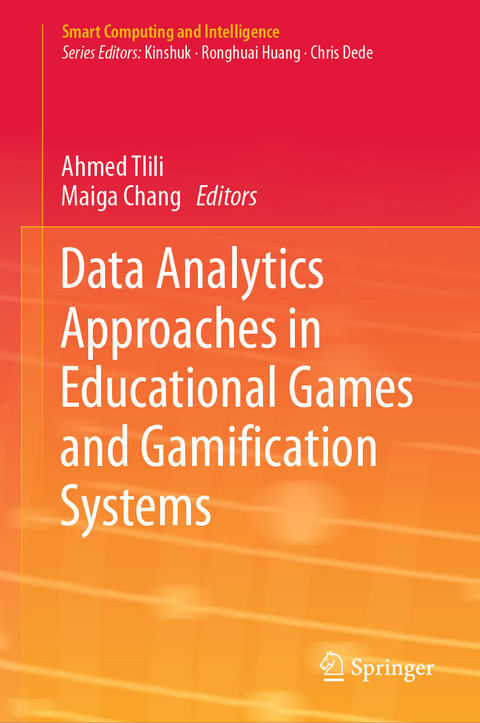
Data Analytics Approaches in Educational Games and Gamification Systems
Springer Verlag, Singapore
978-981-329-334-2 (ISBN)
After a general introduction to help readers become familiar with the subject area, the individual chapters each discuss a different aim of applying data analytics approaches in educational games and gamification systems. Lastly, the conclusion provides a summary and presents general guidelines and frameworks to consider when designing smart game-based learning environments with learning analytics.
Dr. Ahmed Tlili is a Postdoctoral Researcher at the Smart Learning Institute of Beijing Normal University, China. His research areas include game-based learning, smart learning environments, technology enhanced learning, learner modeling, adaptive learning systems, learning analytics, and educational psychology. Dr. Maiga Chang is a Full Professor at the School of Computing and Information Systems at Athabasca University, Canada. His research mainly focuses on mobile and ubiquitous learning, museum e-learning, game-based learning, educational robots, learning behaviour analysis, data mining, intelligent agent technology, computational intelligence in e-learning, and mobile healthcare.
Section 1: Introduction.- Chapter 1: The Importance of Applying Data Analytics Approaches in Educational Games and Gamification Systems.- Section 2: Learning Analytics in Educational Games and Gamification Systems.- Chapter 2: Learning Analytics in Educational Games: Potentials, Approaches, Challenges.- Chapter 3: Assessing Motivational Factors through Learning Analytics in Digital Game-Based Learning.- Chapter 4: Supporting Team-Based Learning in Challenge-Based Game-Based Learning.- Chapter 5: Towards an Analytics Framework for Educational Mini Games across Subjects.- Chapter 6: Sequential Data Mining Approaches in Game Analytics.- Chapter 7: iMoodle: An Intelligent Gamified Moodle to Identify “at-Risk” Students.- Section 3: Academic Analytics and Learning Assessment in Educational Games and Gamification Systems.- Chapter 8: The Effect of 3D Board Game on Learning Human Internal Organs for the Elementary Students.- Chapter 9: Online Multiplayer Educational Game with Analytics (OMEGA).- Chapter 10: Educational Gamification Improves Business Performances.- Chapter 11: Benefits of a Gamification Platform for Assessing the Development of Computational Thinking.- Section 4: Modeling Learners and Finding Individual Differences by Educational Games and Gamification Systems.- Chapter 12: Educational Games: Modeling Individual Differences of Learners.- Chapter 13: Learning Modeling and Analytics in Computational Thinking Games for Education.- Chapter 14: Towards a New Unobtrusive Approach for Learner Profiling Using Games.- Chapter 15: Considering Personal, Functional, Psychological, Temporal, Playful, Implementable and Evaluative Properties in Gamification: A Conceptual Approach.- Section 5: Conclusion.- Chapter 16: General Guidelines of Incorporating Learning Analytics in Educational Games and Gamification Systems.
| Erscheinungsdatum | 27.09.2019 |
|---|---|
| Reihe/Serie | Smart Computing and Intelligence |
| Zusatzinfo | 56 Illustrations, color; 13 Illustrations, black and white; XX, 255 p. 69 illus., 56 illus. in color. |
| Verlagsort | Singapore |
| Sprache | englisch |
| Maße | 155 x 235 mm |
| Themenwelt | Schulbuch / Wörterbuch ► Unterrichtsvorbereitung ► Unterrichts-Handreichungen |
| Sozialwissenschaften ► Pädagogik ► Schulpädagogik / Grundschule | |
| ISBN-10 | 981-329-334-9 / 9813293349 |
| ISBN-13 | 978-981-329-334-2 / 9789813293342 |
| Zustand | Neuware |
| Haben Sie eine Frage zum Produkt? |
aus dem Bereich


